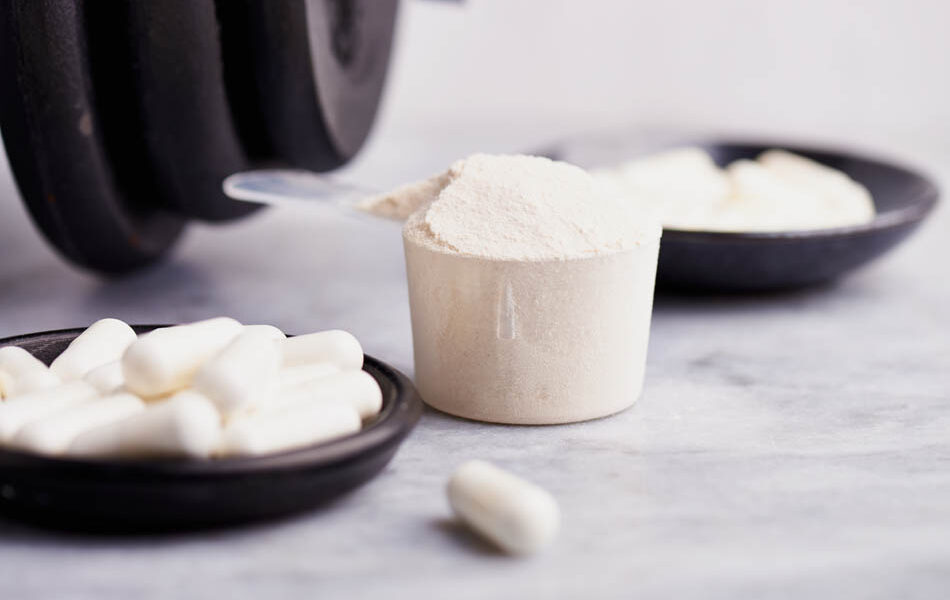Does Creatine Break a Fast? Exploring its Effects on Fasting

If you’ve ever fixed yourself up a mixture of pre-workout, you’ve probably come across this ingredient: creatine. Creatine and creatine supplements are well known for enhancements in the exercise world.
But can you have creatine while intermittent fasting? Our experts look at creatine supplements and what they do to the body to determine whether or not you can safely have creatine during your fasting periods.
Does Creatine Break a Fast?
Creatine supplements contain no calories and do not create an insulin response, so it won’t break your fast.
When it comes to intermittent fasting, there are a couple of main reasons people decide to fast: losing weight and gut rest.
When fasting for weight loss, you want to ensure that whatever you consume during your fasting window has little to no calories and doesn’t create an insulin spike. Anything you consume should not stimulate your GI tract when fasting for gut rest.
What Is Creatine, and What Does It Do?
If you’re new to the idea of a creatine supplement, let’s look at what creatine is and what it does.
Creatine is found naturally in muscles within the human body. As a supplement, creatine is often taken to enhance physical performance, help build muscle mass, and help build strength.
Before being made into a creatine supplement, creatine is one of many amino acids found naturally within the body. Creatine, in particular, is found within the muscle cells and the brain. In supplement form, creatine monohydrate is the most popular way to take it.
Most pre-workouts available on the market have some form of creatine supplement or creatine monohydrate in them. It can be taken either pre-workout or post-workout to help your body recover faster from an intense workout session.
If you still have questions about creatine, try checking this article for more information.
4 Benefits of Creatine
The fitness industry loves creatine for a variety of reasons. Here are some of the top benefits of this popular supplement.
#1 Helps to recover faster
Creatine supplements help your body recover from a hard workout. They encourage muscle cells to repair quicker and to produce more energy so that you’re not as sore after high-intensity exercise.
#2 Improves strength while exercising
If you’re looking to build muscle size and improve your strength training, creatine is right. Many creatine supplements are explicitly used to help with lifting weights and building muscle strength within the fitness community.
#3 Better endurance performance
If you’re starting your fitness journey, creatine is a great way to help you slowly build up your endurance. Creatine gives your muscles and your brain more energy, which allows you to exercise for more extended periods without getting fatigued.
#4 Increases lean mass
Lean mass is the mass of your body minus any fat. You can build more lean mass with creatine while your body effectively burns fat. Your muscles can build mass faster with creatine, making it easier to reach your fitness goals.
Side Effects of Creatine
As with most popular supplements, there are some side effects of creatine. Here are the most common side effects of creatine, so you can decide whether or not you’d like to take these supplements based on scientific evidence.
#1 Bloating and digestive issues
One of the main side effects of taking creatine is digestive issues. Like many diet supplements on the market, it seems to have a lot to do with dosing. Excess doses of creatine can increase the risk of diarrhea, while low doses cause no effect whatsoever.
#2 Dehydration
The use of creatine can often alter the way your body stores water. This means that creatine will drive more and more water into your muscles. While this can be a good thing, it can also leave you feeling dehydrated. While taking creatine, make sure you’re drinking water.
#3 Kidney damage and kidney stones
When taking large doses of creatine, it has been shown to affect the levels of creatinine found in the blood. Creatinine is the breakdown of creatine and is often measured when looking at kidney damage. The damage done by creatine has often been found in people already at risk for kidney disease or who have kidney stones.
#4 Weight gain
When taking creatine, you may find a rapid increase in weight gain. However, weight gain and creatine are not directly related because it doesn’t promote fat gain, instead, it helps to build and promote muscle mass, which might increase your weight.
Limit your creatine intake if you’re concerned with the numbers on the scale.
Is It Okay to Take Creatine Every Day?
While there are potential side effects for taking creatine in large doses, it has been proven safe in small amounts for long periods. Doses up to 25 grams for 14 days have proven to be safe, while doses of up to 10 grams daily for up to 5 years have also proven safe.
If you experience any concerning side effects, stop taking creatine immediately and talk with your doctor.
Is Creatine Safe for Kidneys?
If you are already at risk of renal disease or kidney stones, you should not take any creatine supplementation. However, on its own, safe and small doses of creatine have not been shown to cause excess damage to the kidneys.
A Word From Our RD
Creatine is often an effective supplement for people looking to build muscle or lose weight. It keeps your body energized and your mind activated while doing intense, high-energy exercises.
Intermittent fasting can have a lot of rules. People new to the lifestyle may struggle to know what supplements they can or can’t take. Pure creatine has never been shown to increase your body’s blood sugar or cause any issue during the fasting period.
However, if you’re ever concerned, you can always save your creatine for your eating window. While it doesn’t affect your insulin levels, many people still prefer only to drink water during their fasting window.
Conclusion
So, will creatine break a fast during intermittent fasting? Our answer is no!
To break your fast, you would have to raise your insulin levels to a “spike” level or take something that stimulates the digestive tract.
Creatine does neither of these things. While some side effects are to be wary of, creatine is generally a safe supplement, so long as you take it within the recommended dosage.

















































 Select your language:
Select your language: 








